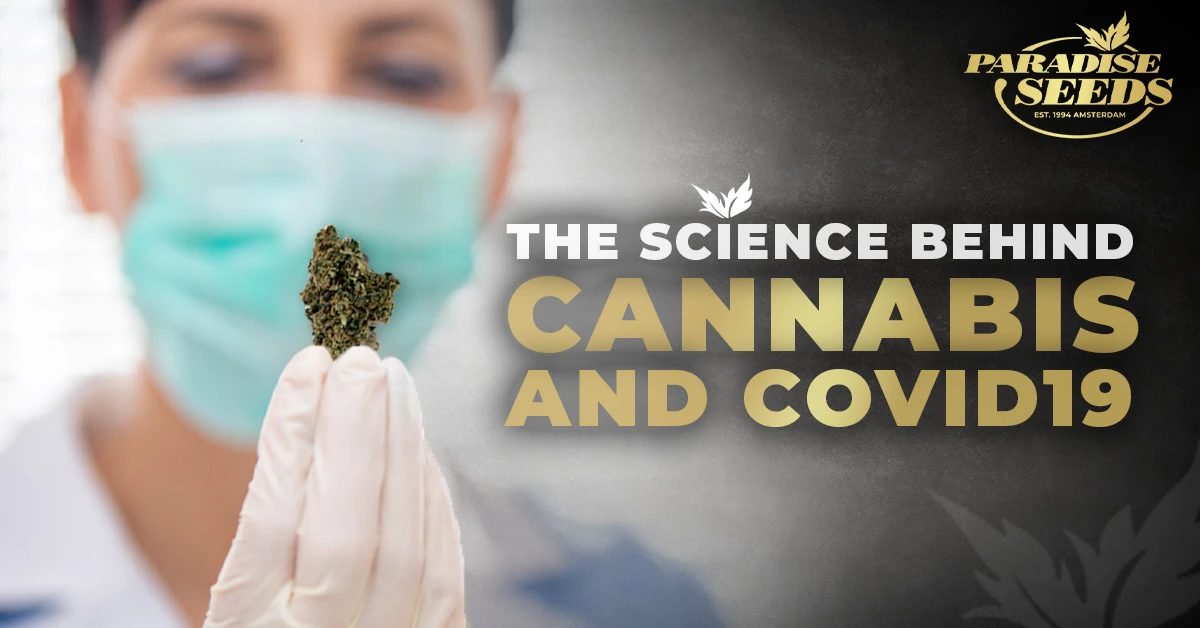Media reports of cannabis and Covid treatment research have naturally grabbed the interest of the cannabis faithful. This month Paradise’s Undercover Scientist scratches beneath the surface to examine the scientific study detail behind the media headlines.
When considering cannabis and Covid there are three areas of interest: the effects of medical cannabis on a body with the Covid virus; the effect of the pandemic on the consumption of cannabis; and how the reception of scientific research during the pandemic could affect future understandings of cannabis research in the future.
Cannabis, Covid 19: Statistics and personal Bias
The global outbreak of Covid 19 has not only generated much scientific research but has also amplified fractures in what people believe causes illness, treats illness and how they see the political, economic and institutional systems that structure health care. Therefore, when scientists conduct research, and we read about it either in journals, media or social media, that knowledge is affected by wider debates and notably by our own political position.
As statistician and broadcaster. Tim Hartford, explains, the emotional attachment to evidence is a tested and significant factor influencing our opinions of statistics and statistically driven science. In short, we believe what we support and seek to disprove what we do not support, regardless of the actual data. An affect which, ironically, is exaggerated when people have more intelligent or have expertise in an area [1]. For me, that insight explains much of what I have witnessed in reactions to the pandemic.
So, when we look at cannabis and Covid 19, the same characteristics apply. Those who want to pursue cannabis medicines will find reason to look at the data that supports their argument while ignoring data that is contrary to their beliefs, while those who feel that cannabis is still are problematic medicine will support data against it and ignore the benefits it brings (see, for example, a study on cannabis-induced mania related to Covid [2]).
Cannabis, Covid 19 and the cytokine storm
The leading cause of COVID-19 mortality is respiratory failure due to acute respiratory distress syndrome. This effect is characterized by a two-stage immune response. In the first phase the body develops responses to combat the disease to fight. In the cases of fatalities, these responses lead to a second stage whereby the body creates a virally induced cytokine storm syndrome [3]. Broadly speaking, a cytokine storm is a cascade of exaggerated immune responses that can cause serious problems. Specific to the respiratory system, lung epithelial cells have been suggested to play a crucial role in the release of several pro-inflammatory cytokines [4][5]. Cannabis has been associated with suppressing immune and inflammatory functions [6] and so has been suggested as a pathway for Covid treatments [7][8] because it has the potential to subdue the cytokine storm [9].
The source of cannabis and Covid 19 studies
With so many companies trading extract-based cannabis medicines, industry-funded studies are emerging that suggest that some of these extracts may be beneficial for Covid interventions, but for such important scientific insight the choice of publication is curious. For example, one company published their product research in the journal ‘Ageing’. Prima face, it is hard to see how this research fits into that journal’s usual area of expertise. The company tested their own line of CBD extracts finding that they decrease ACE2 protein levels, thus potentially affecting Covid’s pathway into the human body through gateway tissues [10].
With more independent weight, and with no declared conflicts of interests, an Oregon-based study in the Journal of Natural Products used affinity selection-mass spectrometry to show that cannabigerolic acid and cannabidiolic acid from hemp prevented entry into cells not only by the SARS-CoV-2 virus but also by the SARS-CoV-2 alpha variant B.1.1.7 and the beta variant B.1.351[11]. Although this latter study gained much media attention and was featured by Forbes’ cannabis correspondent [12], these journals, while offering important contributions to knowledge, are not leaders of thinking in the wider scientific community.
Cannabis and Covid treatment?
The possible treatment of Covid with cannabis is, however, rather more complicated than these early studies show. While some compounds have beneficial anti-inflammatory effects, reducing cytokine secretion in lung epithelial cell, other compounds have a reverse, pro-inflammatory effect. A study in leading scientific journal Nature found that, at a cellular level, phytocannabinoid (compounds derived from the whole plant rather than a combination of cannabis derived extracts) have the potential for developing into Covid treatments.
However, because other combinations, especially those where extracted terpenes are introduced into the formula, can have a detrimental effect, the study warns that treatment with cannabis should be avoided until further studies clarify specifically which form of cannabis treatment will have a beneficial effect [13]. For example, many cannabis patients take their medication via the lungs, which are the main target of the Covid virus. Thus, there is research cited by researchers looking at the relationship between cannabis and Covid that claims cannabis contributes to lung injuries either through vaping [14] or smoking [15] or the use of tobacco with cannabis [16] and can exasperate difficulties in Covid patients who are experiencing clinical complications [17]. Of those concerned, one study highlights that heavy consumption of cannabis and alcohol has been shown to increase pulmonary inflammation in mice with pneumonia [18].
With Covid amplifying fractures in our acceptance of evidence, health, ‘truth’, ‘facts’ and research, cannabis could become another football to kick around and continue the conflict of knowledge game currently played out by activists and scientists alike through social media.
Therefore, if you want some more complex thinking on the subject and would like an insight into how debates around Covid could shape cannabis research, take a close look at an article by Theodore Caputi in the International Journal of Drug Policy.
‘What cannabis can learn from Covid: Hydroxychloroquine research suggests the next step for medical cannabis research’ [18]. Caputi examines in detail how scientific research is publicised and disputed, he then applies this analysis to how we might evaluate the science around cannabis in the future. As both Covid and cannabis occupy contentious terrains, the question is how far can anyone read it without an emotional bias
- Tim Hartford, ‘How to Make the World Add Up’ Hachette Book Group https://www.hachette.co.uk/titles/tim-harford/how-to-make-the-world-add-up/9780349143866/
- Kaggwa, Mark Mohan et al. “Cannabis-Induced Mania Following COVID-19 Self-Medication: A Wake-Up Call to Improve Community Awareness.” International medical case reports journal vol. 14 121-125. 25 Feb. 2021, doi:10.2147/IMCRJ.S301246
- Gao, Y. et al. Diagnostic utility of clinical laboratory data determinations for patients with the severe COVID-19. J. Med. Virol. 92, 791–796 (2020). DOI: 10.1002/jmv.25770
- https://www.verywellhealth.com/cytokine-storm-syndrome-4842383
- Mehta, P. et al. COVID-19: Consider cytokine storm syndromes and immunosuppression. Lancet 395, 1033 (2020). DOI: https://doi.org/10.1016/S0140-6736(20)30628-0
- Rizzo MD, Henriquez JE, Blevins LK, Bach A, Crawford RB, Kaminski NE. Targeting cannabinoid receptor 2 on peripheral leukocytes to attenuate inflammatory mechanisms implicated in HIV-associated neurocognitive disorder. J. Neuroimmune Pharmacol. doi: 10.1007/s11481-020-09918-7
- Rossi F, Tortora C, Argenziano M, Di Paola A, Punzo F. Cannabinoid receptor type 2: a possible target in SAR-CoV-2 (CoV-19) infection? Int. J. Mol. Sci. 21(11) doi: 10.3390/ijms21113809
- Costiniuk CT, Jenabian MA. Acute inflammation and pathogenesis of SAR-CoV-2 infection: cannabidiol as a potential anti-inflammatory treatment. Cytokine Growth Factor Rev. 53, 63–65 (2020) doi: 10.1016/j.cytogfr.2020.05.008
- Onaivi, E.S. and Sharma, V., 2020. Cannabis for COVID-19: can cannabinoids quell the cytokine storm?. Future Science OA, 6(8), p.FSO625. https://doi.org/10.2144/fsoa-2020-0124
- Wang B, Kovalchuk A, Li D, et al. In search of preventive strategies: novel high-CBD Cannabis sativa extracts modulate ACE2 expression in COVID-19 gateway tissues. Aging (Albany NY). 2020;12(22):22425-22444. doi:10.18632/aging.202225
- van Breemen RB, Muchiri RN, Bates TA, Weinstein JB, Leier HC, Farley S, Tafesse FG. Cannabinoids Block Cellular Entry of SARS-CoV-2 and the Emerging Variants. J Nat Prod. 2022 Jan 10:acs.jnatprod.1c00946. DOI: 10.1021/acs.jnatprod.1c00946
- https://www.forbes.com/sites/ajherrington/2022/01/11/study-finds-cannabis-compounds-prevent-infection-by-covid-19-virus/?utm_campaign=forbes&utm_source=facebook&utm_medium=social&utm_term=Valerie&fbclid=IwAR345q6WGowm0PlVXDWBiWB4Nj9uAlL_lGzg7K1zHrqIkXaBmGuCcRhDk2k&sh=34ea3feb1753
- Anil, S.M., Shalev, N., Vinayaka, A.C. et al. Cannabis compounds exhibit anti-inflammatory activity in vitro in COVID-19-related inflammation in lung epithelial cells and pro-inflammatory activity in macrophages. Sci Rep 11, 1462 (2021). https://www.nature.com/articles/s41598-021-81049-2
- Darmawan DO, Gwal K, Goudy BD, Jhawar S, Nandalike K. Vaping in today’s pandemic: E-cigarette, or vaping, product use–associated lung injury mimicking COVID-19 in teenagers presenting with respiratory distress. SAGE Open Med Case Rep 2020 doi: 10.1177/2050313X20969590
- Downer EJ. Cannabinoids and innate immunity: taking a toll on neuroinflammation. Sci World J. 2011;11:855–65. DOI: 10.1100/tsw.2011.84
- Brake SJ, Barnsley K, Lu W, McAlinden KD, Eapen MS, Sohal SS. Smoking upregulates angiotensin-converting enzyme-2 receptor: a potential adhesion site for novel coronavirus SARS-CoV-2 (Covid-19). J Clin Med. 2020; 9:841. https://doi.org/10.3390/jcm9030841
- Borgonhi, E.M., Volpatto, V.L., Ornell, F. et al. Multiple clinical risks for cannabis users during the COVID-19 pandemic. Addict Sci Clin Pract 16, 5 (2021). https://doi.org/10.1186/s13722-021-00214-0
- Sivaraman, V.; Richey, M.M.; Nasir, A. Alcohol, Cannabis and Crossfading: Concerns for COVID-19 Disease Severity. Biology2021, 10, 779. https://doi.org/10.3390/biology10080779
- Caputi TL. What cannabis can learn from Covid: Hydroxychloroquine research suggests the next step for medical cannabis research. Int J Drug Policy. 2021;93:103133. https://doi.org/10.1016/j.drugpo.2021.103133


